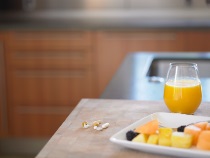 Aging is not an illness. However, as we age, our metabolism slows and our ability to heal can decline, so it is important to prioritise health and give ourselves the best chance to remaining fit and healthy.
Aging is not an illness. However, as we age, our metabolism slows and our ability to heal can decline, so it is important to prioritise health and give ourselves the best chance to remaining fit and healthy.
If you experience a period of ill health, or are diagnosed with a chronic condition, you will recover better if your nutrition is sound and you are otherwise in good physical shape.
We have access to an enormous variety and quantity of food in New Zealand. Not all food is created equal. Aim to eat the most nutrient-dense diet you can to maintain good health.
Supplements and medication
Supermarkets and chemists are full of supplements and vitamins. If you have a specific health condition, and are advised by a health professional, these supplements can be a vital support to your immune system and overall health. However, supplements do not replace a healthy diet.
Medication can interfere with your body’s ability to absorb certain nutrients, either in the short term or over time. Likewise, some vitamins should not to be taken at the same time of day (for example iron and calcium) as they may cancel eachother out. Always seek professional advice, to make sure you are getting the best for your body, and your wallet!
It is wise to seek advice on extra vitamin C (particularly at the change of seasons), fish or flaxseed oils for brain and joint function and calcium to protect your bones.
If you are on prescribed medication, keep in regular contact with your doctor and ask questions – how long do I need to take this for? Can I do anything to help myself? Are there alternatives? Medication is wonderful, but is often designed to be taken in the short term, so try to maintain a healthy body yourself, rather than relying on pills.
Move daily
Exercise promotes healthy circulation and improves the uptake and use of these extra nutrients by your body. Have your health professional guide you as to what is appropriate exercise when ill or injured. If ill, exercise should not exhaust you and there are times when it is simply best for you to rest up – listen to your body.
Exercise, such as a daily walk, golf, yoga, pilates or a bike ride will support your immune system, help regulate appetite, increase your energy, improve your circulation, help maintain bone density and good posture and ensure you get a dose of vitamin D if it is outdoors. Exercise also helps to prevent depression, as it promotes the release of endorphins (your body’s natural ‘feel good’ hormones). It is also a great way to add a social component to your day – It’s very hard to go for a walk and not meet some other people en route!
Did you know that as many as 70% of the institutionalised elderly may be suffering from malnutrition and as many as 10% of the non-institutionalised elderly population may be malnourished?
Eat nutrients not calories
There is a real difference between eating to feel full and eating to be nourished. As we age, our appetites often decrease, due to a decrease in activity. Eat a nutrient dense diet as opposed to a calorie dense one – fill every meal with fresh food that supports your health. Aim to eat fruit or vegetables with every meal. Add a variety of colours to your diet and choose seasonal produce to keep costs down. Choose small portions of lean meat or fish several times per week. Drink plenty of water to aid digestion, rather than only tea or coffee.
Frozen vegetables or berries are an excellent option as well, but no matter how they arrived at your table, take care not to overcook vegetables, they should still maintain their vibrant colours and interesting textures.
Choose to live a healthy and active life. Make small changes if you must, to ensure that all of your years are lived as healthily as possible. Everything is easier when you feel good.









Willow - 9 years ago
In essence, good advice, although ‘fill every meal with fresh food’ should read ‘fill every meal with fresh raw food’. Two years ago I went on a mostly raw food diet/lifestyle (still boil my potatoes and rice!) and my health improved in leaps and bounds. I lost 12 kg, my arthritis disappeared, and I now take no medication or supplements of any kind. I even eat my eggs raw – they make my morning smoothie deliciously creamy. I walk 11 – 15 km every week. I’ll never go back to my old way of eating – I’m 72 going on 30!